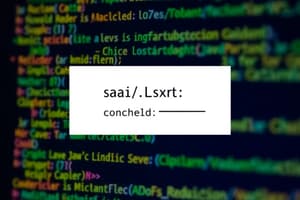Podcast
Questions and Answers
What is the correct syntax for checking if x is greater than 3 in Java?
What is the correct syntax for checking if x is greater than 3 in Java?
- if (x > 3) System.out.println("x is greater than 3"); (correct)
- if (x > 3) print("x is greater than 3");
- if x > 3: System.out.println("x is greater than 3");
- If (x > 3); System.out.println("x is greater than 3");
What will happen when the following code is executed: int a = 7; int b = --A; System.out.println(b + a);?
What will happen when the following code is executed: int a = 7; int b = --A; System.out.println(b + a);?
- 6
- 7
- 8
- Error (correct)
What will be the output of the following code: Int x = -5; if (x >= 0) System.out.println("Positive"); else System.out.println("Negative or Zero");?
What will be the output of the following code: Int x = -5; if (x >= 0) System.out.println("Positive"); else System.out.println("Negative or Zero");?
- Positive
- Negative or Zero
- Error (correct)
- None of the above
Which code correctly calculates the area of a circle given a radius?
Which code correctly calculates the area of a circle given a radius?
Which of the following correctly reads an integer input from the keyboard in Java?
Which of the following correctly reads an integer input from the keyboard in Java?
Which statement is accurate regarding the switch statement in Java?
Which statement is accurate regarding the switch statement in Java?
In what scenario will the following code execute without errors? if (x == 15) System.out.println("x is 15"); else (System.out.println("x is not 15"));
In what scenario will the following code execute without errors? if (x == 15) System.out.println("x is 15"); else (System.out.println("x is not 15"));
What is the value of the expression: !(3 > 5 && 2 == 2)?
What is the value of the expression: !(3 > 5 && 2 == 2)?
Which of the following declares a variable x of type int correctly?
Which of the following declares a variable x of type int correctly?
Which statement is true regarding Java identifiers?
Which statement is true regarding Java identifiers?
What will be the output of this code? int X = 4; x--; System.out.println(X + 1);
What will be the output of this code? int X = 4; x--; System.out.println(X + 1);
Which of the following code snippets correctly prints 'Hello, Java!'?
Which of the following code snippets correctly prints 'Hello, Java!'?
What is the correct way to compare two values in Java?
What is the correct way to compare two values in Java?
Which of the following expressions correctly checks if a number n is divisible by 3?
Which of the following expressions correctly checks if a number n is divisible by 3?
What will the following code print? int a = 5; int b = 4; int c = a * (b + 2); System.out.println(C + a);
What will the following code print? int a = 5; int b = 4; int c = a * (b + 2); System.out.println(C + a);
What is the result of the following expression: (5 > 3 || 7 < 6)?
What is the result of the following expression: (5 > 3 || 7 < 6)?
Flashcards are hidden until you start studying
Study Notes
Variable Declaration
- Correct way to declare an int variable:
int x = 10; - Capitalization matters in Java; use lower case for data types.
Java Identifiers
- Identifiers can be of any length; no special starting characters allowed.
- They can include underscores.
Code Output and Errors
- Java is case-sensitive, leading to potential errors; e.g., using
Xandxinconsistently results in an error. - For print statements, correct syntax:
System.out.println("Hello, Java!");
Comparison Operators
- Use
==to compare two values:if (x == y); - Avoid using assignment operator
=for comparison.
Modulo Operator
- To check if
nis divisible by 3:if (n % 3 == 0);
Data Types and Initialization
- To correctly declare and initialize a double, use
double amount = 20; - Ensure correct casing in variable names to avoid errors.
Logical Expressions
- The expression
(5 > 3 || 7 < 6)evaluates totruesince at least one condition is true.
Type Casting and Numerical Operations
- Use parentheses to control operation precedence; casting is needed to avoid integer division loss.
- Errors can arise from improper casing of variables like using
Binstead ofb.
Conditional Statements
- Correct syntax for
if-else:if (x > 3) { ... } else { ... } - Ensure to use parentheses in conditions and avoid misplaced colons or semicolons.
Switch Statements
- Switch statements can evaluate non-numeric expressions as well.
- While
breakstatements are commonly used to prevent fall-through, they are not strictly required.
Input Handling
- Read integer input from the keyboard correctly with
input.nextInt();
Logical Operators
- The expression
!(3 > 5 && 2 == 2)results intruebecause the inner condition(3 > 5)is false.
Studying That Suits You
Use AI to generate personalized quizzes and flashcards to suit your learning preferences.




